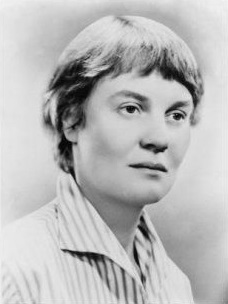
Dame Jean Iris Murdoch was an Irish and British novelist and philosopher. Murdoch is best known for her novels about good and evil, sexual relationships, morality, and the power of the unconscious. Her first published novel, Under the Net (1954), was selected in 1998 as one of Modern Library's 100 best English-language novels of the 20th century. Her 1978 novel The Sea, The Sea won the Booker Prize. In 1987, she was made a Dame by Queen Elizabeth II for services to literature. In 2008, The Times ranked Murdoch twelfth on a list of "The 50 greatest British writers since 1945".

Rupert Chawner Brooke was an English poet known for his idealistic war sonnets written during the First World War, especially "The Soldier". He was also known for his boyish good looks, which were said to have prompted the Irish poet W. B. Yeats to describe him as "the handsomest young man in England". He died of septicaemia following a mosquito bite whilst aboard a French hospital ship moored off the island of Skyros in the Aegean Sea.
John Oliver Bayley, CBE, FBA, FRSL was a British academic, literary critic and writer. He was the Warton Professor of English at the University of Oxford from 1974 to 1992. His first marriage was to the novelist and philosopher Iris Murdoch.

Grantchester is a village and civil parish on the River Cam or Granta in South Cambridgeshire, England. It lies about two miles (3 km) south of Cambridge.
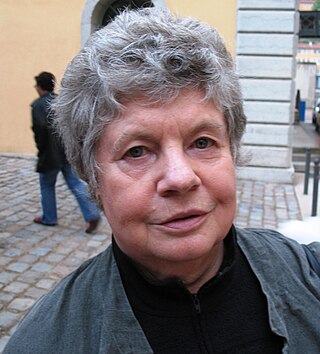
Dame Antonia Susan Duffy, known professionally by her former married name, A. S. Byatt, was an English critic, novelist, poet and short-story writer. Her books have been translated into more than thirty languages.

The Sea, The Sea is a novel by Iris Murdoch. Published in 1978, it was her nineteenth novel. It won the 1978 Booker Prize.
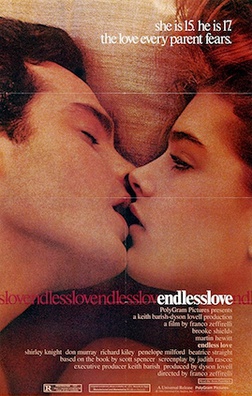
Endless Love is a 1981 American romantic drama film directed by Franco Zeffirelli, and starring Brooke Shields, Martin Hewitt, Shirley Knight, Don Murray, Richard Kiley, Penelope Milford and Beatrice Straight. It also marked Tom Cruise's film debut.

Anna Maria dePeyster is a British and Australian journalist and novelist. She became known as the second wife of media mogul Rupert Murdoch, and was a director at News Corp.

The Old Vicarage in the Cambridgeshire village of Grantchester is a house associated with the poet Rupert Brooke, who lived nearby and in 1912 referenced it in an eponymous poem – "The Old Vicarage, Grantchester". The house is next door to The Orchard tea garden, also part of the poem. A portrait statue of Brooke by Paul Day stands in the front garden.

Mary Noel Streatfeild OBE was an English author, best known for children's books including the "Shoes" books, which were not a series. Random House, the U.S. publisher of the 1936 novel Ballet Shoes (1936), published some of Streatfeild's subsequent children's books using the word "Shoes" in their titles, to capitalize on the popularity of Ballet Shoes; thus Circus Shoes, Party Shoes, Skating Shoes and many more. She won the third annual Carnegie Medal for The Circus Is Coming. She was a member of the historic Streatfeild family.
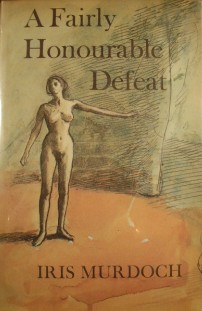
A Fairly Honourable Defeat is a novel by the British writer and philosopher Iris Murdoch. Published in 1970, it was her thirteenth novel.

The Bell is a novel by Iris Murdoch. Published in 1958, it was her fourth novel. It is set in a lay religious community situated next to an enclosed community of Benedictine nuns in Gloucestershire.

The Great Lover is a 2009 biographical novel by Jill Dawson. The novel follows the fictional Nell Golightly as she encounters the eccentric poet Rupert Brooke in Grantchester, Cambridgeshire. Set from 1909 until 1914, in the novel Dawson examines Brooke's relationship with Nell, and his growth as a poet and individual. The novel is based on the biography of Brooke during that period, incorporating opinions, ideas, and excerpts from Brooke's letters and other primary sources documenting his life.

The Unicorn is a novel by Iris Murdoch. Published in 1963, it was her seventh novel.

The Message to the Planet is a novel by Iris Murdoch. Published in 1989, it was her twenty-fourth novel.
"The Old Vicarage, Grantchester" is a light poem by the English Georgian poet Rupert Brooke (1887–1915), written in Berlin in 1912. Initially titled "The Sentimental Exile", Brooke, with help from his friend Edward Marsh, renamed it to its the title the poem is commonly known as.

The Sacred and Profane Love Machine is a novel by Iris Murdoch. Published in 1974, it was her sixteenth novel. It won the Whitbread Novel Award for 1974.
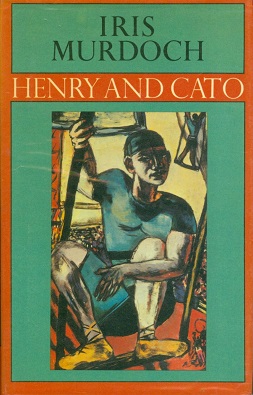
Henry and Cato is a novel by Iris Murdoch. Published in 1976, it was her eighteenth novel.

An Accidental Man is a novel by Iris Murdoch, which was published in 1971. It was her fourteenth novel.

The Time of the Angels is a philosophical novel by British novelist Iris Murdoch. First published in 1966, it was her tenth novel. The novel centres on Carel Fisher, an eccentric Anglican priest who is the rector of a London church which was destroyed by bombing during World War II. Fisher denies the existence of God and the possibility of human goodness in a post-theistic world. The novel, which has elements of Gothic fiction, received mixed reviews on its publication.

















